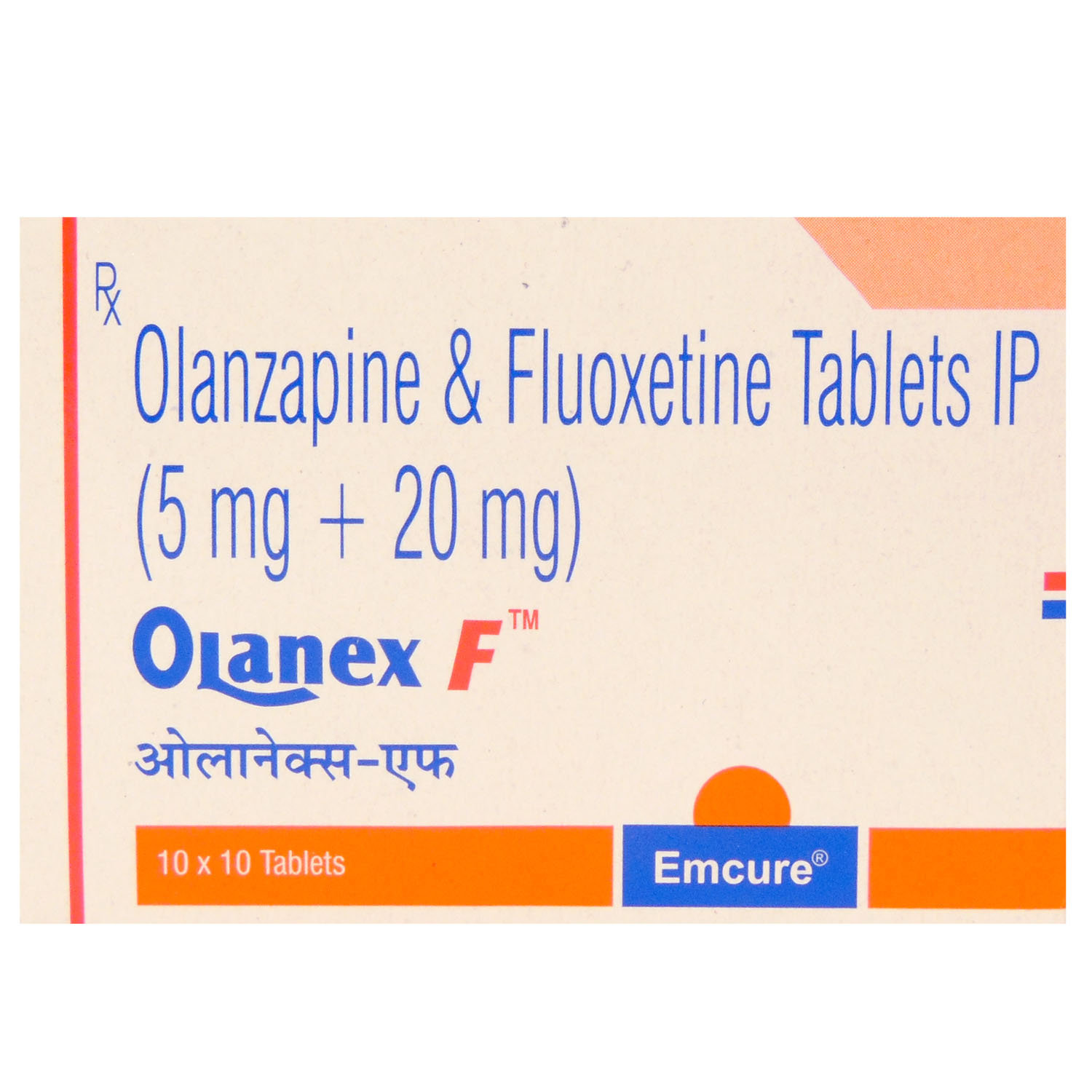O Ladott-Plus Tablet
MRP ₹57
(Inclusive of all Taxes)
₹8.6 Cashback (15%)
Provide Delivery Location
Online payment accepted
 Prescription drug
Prescription drugWhats That
Composition :
Manufacturer/Marketer :
Consume Type :
Expires on or after :
Return Policy :
About O Ladott-Plus Tablet
O Ladott-Plus Tablet belongs to the class of antipsychotics used in the treatment of schizophrenia or psychosis and bipolar disorder (manic depression). Schizophrenia is characterized by symptoms of hallucinations (seeing or hearing things that are not real) and delusions (wrong beliefs). Manic episodes of excitement or depression characterize bipolar disorder. O Ladott-Plus Tablet prevents the occurrence of these symptoms.
O Ladott-Plus Tablet consists of two medicines, namely: Fluoxetine and Olanzapine. O Ladott-Plus Tablet works by helping to restore the balance of certain natural substances in the brain. The key action of O Ladott-Plus Tablet is to block some of the dopamine receptors in the brain and to correct the overactivity of dopamine. On the other hand, it also affects other brain neurotransmitters, such as serotonin (5-HT), which may lead to its beneficial effects. Altogether O Ladott-Plus Tablet may help to decrease hallucinations and help you to think more clearly and positively about yourself, feel less agitated, and take a more active part in everyday life.
You are suggested to take $ame for as long as your doctor has prescribed it. Common side-effects of O Ladott-Plus Tablet are drowsiness, lightheadedness, restlessness, irritability, tremor, dry mouth, constipation, increased appetite, extreme fatigue, decreased libido, swelling of the hands or feet, or weight gain. Inform your doctor if any of these side effects persist or worsen.
Do not take O Ladott-Plus Tablet if you are allergic (hypersensitive) to any of the ingredients present in this medicine. Inform your doctor if you have a medical history of dementia, glaucoma (increased pressure in the eye), stroke, heart diseases, diabetes, liver or kidney disease, Parkinson’s disease (brain disorder), epilepsy (seizures), prostate problems, a blocked intestine (Paralytic ileus), and blood disorders. O Ladott-Plus Tablet may increase blood glucose levels, so inform your doctor immediately if you have symptoms such as increased thirst or urination. It may also cause weight gain and increase fat levels in the body.
Uses of O Ladott-Plus Tablet
Directions for Use
Key Benefits
O Ladott-Plus Tablet is used in the treatment of schizophrenia or psychosis and bipolar disorder (manic depression). O Ladott-Plus Tablet works by helping to restore the balance of certain natural substances in the brain. The key action of O Ladott-Plus Tablet is to block some of the dopamine receptors in the brain and to correct the overactivity of dopamine. On the other hand, it also affects other brain neurotransmitters, such as serotonin (5-HT), which may lead to its beneficial effects. Altogether O Ladott-Plus Tablet may help to decrease hallucinations and help you to think more clearly and positively about yourself, feel less agitated, and take a more active part in everyday life.
Storage
- Avoid driving or operating machinery or activities that require high focus until you know how the medication affects you.
- Maintain a fixed sleeping schedule, create a relaxing bedtime routine and ensure your sleeping space is comfortable to maximize your sleep quality.
- Limit alcohol and caffeine as these may worsen drowsiness and disturb sleep patterns.
- Drink plenty of water as it helps with alertness and keeps you hydrated and for overall well-being.
- Moderate physical activity can improve energy levels, but avoid intense workouts right before bedtime.
- Eat a balanced diet containing enough proteins, fibre, healthy fats, vegetables and fruits.
- Get quality sleep for about 7-9 hours.
- Try to manage stress with meditation or yoga.
- Drink enough water.
- Exercise regularly as it helps regulate appetite.
- Rest well; get enough sleep.
- Eat a balanced diet and drink enough water.
- Manage stress with yoga and meditation.
- Limit alcohol and caffeine.
- Physical activities like walking or jogging might help boost energy and make you feel less tired.
- Inform your doctor about dry mouth symptoms. They may adjust your medication regimen or prescribe additional medications to manage symptoms.
- Drink plenty of water throughout the day to help keep your mouth moist and alleviate dry mouth symptoms.
- Chew sugar-free gum or candies to increase saliva production and keep your mouth moisturized.
- Use saliva substitutes, such as mouthwashes or sprays, only if your doctor advises them to help moisturize your mouth and alleviate dry mouth symptoms.
- Avoid consuming smoking, alcohol, spicy or acidic foods, and other irritants that may aggravate dry mouth symptoms.
- Schedule regular dental check-ups to keep track of your oral health and handle any dry mouth issues as they arise.
Drug Warnings
Do not take O Ladott-Plus Tablet if you are allergic (hypersensitive) to any of the ingredients present in this medicine or have a medical history of eye problems such as glaucoma (increased pressure in the eye). Before taking O Ladott-Plus Tablet, talk to your doctor if you or your family have a history of blood clots, stroke, or heart diseases and if you are above 65 years and have a history of dementia (memory loss). O Ladott-Plus Tablet may cause weight gain and increase blood glucose and cholesterol levels. Inform your doctor if you are previously diagnosed with diabetes, liver or kidney disease, Parkinson’s disease (brain disorder), epilepsy, prostate problems, a blocked intestine (Paralytic ileus) or blood disorders.
Drug-Drug Interactions
Drug-Drug Interactions
Login/Sign Up
When Ropinirole is taken with O Ladott-Plus Tablet, it may reduce the effectiveness of ropinirole.
How to manage the interaction:
Taking Ropinirole with O Ladott-Plus Tablet is not recommended as it can possibly result in an interaction, it can be taken if your doctor has prescribed it. However, consult the doctor immediately if you experience symptoms such as drowsiness, low blood pressure, dizziness, and lightheadedness. Do not stop using any medications without consulting doctor.
Taking O Ladott-Plus Tablet with Potassium chloride can increase the risk of stomach ulcers, bleeding, and gastrointestinal injury.
How to manage the interaction:
Co-administration of O Ladott-Plus Tablet and Potassium chloride is not recommended as it leads to an interaction, it can be taken if advised by a doctor. However, if you experience any symptoms like severe abdominal pain, bloating, sudden dizziness or lightheadedness, nausea, vomiting (especially with blood), loss of appetite, and/or black, tarry stools, contact a doctor immediately. Do not discontinue any medications without consulting a doctor.
Taking O Ladott-Plus Tablet with Potassium citrate can increase the irritant effects of potassium on your stomach and upper intestine.
How to manage the interaction:
Co-administration of O Ladott-Plus Tablet and Potassium citrate is not recommended as it leads to an interaction, it can be taken if advised by your doctor. However, if you experience any symptoms like severe abdominal pain, bloating, sudden dizziness or lightheadedness, nausea, vomiting (especially with blood), loss of appetite, and/or black, tarry stools, contact a doctor immediately. Do not discontinue any medications without consulting a doctor.
Taking O Ladott-Plus Tablet with Pramipexole can increase the risk and severity of side effects and reduce the effectiveness of Pramipexole.
How to manage the interaction:
Co-administration of O Ladott-Plus Tablet and Pramipexole is not recommended as it leads to an interaction, it can be taken if advised by a doctor. If you experience any symptoms such as drowsiness, dizziness, and lightheadedness, contact a doctor immediately. Avoid driving or operating dangerous machinery, and be careful while getting up from a sitting or lying position. Do not discontinue any medications without consulting a doctor.
Coadministration of O Ladott-Plus Tablet and ciprofloxacin can increase blood levels and the effects of O Ladott-Plus Tablet, which may lead to side effects.
How to manage the interaction:
Although taking ciprofloxacin and O Ladott-Plus Tablet together can possibly result in an interaction, it can be taken if your doctor has prescribed it. However, if you experience difficulty swallowing, low blood pressure, irregular heart rhythm, and seizures(fits) consult the doctor immediately. Do not stop using any medications without talking to a doctor.
When used together, Midazolam and O Ladott-Plus Tablet can cause low blood pressure, shallow breathing, weak pulse, muscle weakness, drowsiness, dizziness and slurred speech.
How to manage the interaction:
Combining of O Ladott-Plus Tablet and Midazolam can lead to an interaction, it can be taken if your doctor has suggested it. If you experience any symptoms consult the doctor immediately. Avoid activities requiring mental alertness until you know how these medications will affect you and do not discontinue any medications without consulting a doctor.
Coadministration of O Ladott-Plus Tablet with Zonisamide can increase the risk or severity of Zonisamide side effects like increased body temperature and decreased sweating especially in warm weather.
How to manage the interaction:
Taking O Ladott-Plus Tablet with Zonisamide together is not recommended as it can result in an interaction, it can be taken if your doctor has advised it. However, if you experience changes in blood pressure, increased heart rate, fever, or excessive sweating, contact a doctor immediately. Make sure to hydrate yourself during warm weather or after exercise. Do not discontinue any medications without consulting a doctor.
Co-administration of O Ladott-Plus Tablet with chlordiazepoxide may significantly increase the occurrence side effects.
How to manage the interaction:
Taking O Ladott-Plus Tablet and chlordiazepoxide together can result in an interaction, it can be taken if your doctor has advised it. However, if you experience any symptoms such as low blood pressure, rapid breathing, weak pulse, muscle weakness, drowsiness, dizziness, or slurred speech, consult a doctor immediately. Do not discontinue any medications without consulting a doctor.
Taking diazepam together with O Ladott-Plus Tablet can cause low blood pressure, weak pulse, shallow breathing, muscle weakness, drowsiness, dizziness and slurred speech.
How to manage the interaction:
Combining O Ladott-Plus Tablet and Diazepam can lead to an interaction, it can be taken if your doctor has suggested it. If you experience any symptoms consult the doctor immediately. Avoid activities requiring mental alertness until you know how these medications will affect you. Do not stop using any medications without first talking to your doctor.
Combining of O Ladott-Plus Tablet and Bupropion can increase the risk of seizures (fits).
How to manage the interaction:
Co-administration of bupropion along with O Ladott-Plus Tablet can lead to an interaction, but it can be taken if recommended by a doctor. While taking these medications, you should avoid tasks that need mental attention, such as driving or operating dangerous machinery. Do not discontinue any medications without consulting a doctor.
Drug-Food Interactions
Drug-Food Interactions
Login/Sign Up
Diet & Lifestyle Advise
- Monitor your mood. Keep track of your mood regularly, including factors such as sleep, medicine, and activities that can impact your mood.
- Exercise daily. Exercise is nice to relieve tension. It can also avoid the weight gain that can be a side effect of your bipolar medication.
- You may also practice calming techniques such as meditation and deep breathing exercises.
- Sleep well. Having enough sleep will help to stabilize your mood.
- Eat a healthy diet. Certain foods may affect your mood more than others. Consider keeping a food log to track what you eat and how certain foods make you feel. Talk to your doctor or nutritionist about foods that may help stabilize your mood.
- Stay optimistic. It will take time for your symptoms to improve after you start bipolar therapy, but you will feel relaxed knowing that you will get better and that the worst is most definitely behind you.
Side Effects of O Ladott-Plus Tablet
- Drowsiness
- Dizziness
- Restlessness
- Tremor
- Stomach upset
- Dry mouth
- Constipation
Habit Forming
Therapeutic Class
All Substitutes & Brand Comparisons
RX
Olapad Plus Tablet 10's
Tripada Healthcare Pvt Ltd
₹56
(₹5.04 per unit)
1% CHEAPERRX
Oline Plus Tablet 10's
D D Pharmaceuticals Pvt Ltd
₹70
(₹6.3 per unit)
22% COSTLIERRX
Supral Plus Tablet 10's
An Pharmaceuticals Pvt Ltd
₹92.5
(₹8.33 per unit)
62% COSTLIER
Drug-Diseases Interactions
Drug-Diseases Interactions
Login/Sign Up
FAQs
Drug-Drug Interactions Checker List
- LORAZEPAM
- TRAMADOL
- DIAZEPAM
- CODEINE
Disease/Condition Glossary
Schizophrenia (psychosis): It is a mental illness in which the processing of brain information is affected. Patients with schizophrenia develop symptoms such as hallucinations (seeing or hearing unreal things), delusions (false beliefs), and become withdrawal from society. They lose the ability to differentiate reality from false beliefs. Patients with bipolar disorders have mood swings ranging from manic episodes of heightened excitement to severe depression. Schizophrenia and bipolar disorder may occur due to genetic factors, alcohol or drug abuse, or mental trauma. Schizophrenia may also occur due to brain injuries or diseases.
Bipolar disorder: It is a mental health condition that affects your moods, which can swing from one extreme to another. It is also known as manic depression.

Have a query?
Alcohol
Safe if prescribed
Patients taking O Ladott-Plus Tablet should avoid taking alcohol as it may increase drowsiness.
Pregnancy
Consult your doctor
O Ladott-Plus Tablet should be used in pregnant women only when prescribed by a doctor.
Breast Feeding
Consult your doctor
O Ladott-Plus Tablet should not be given to breastfeeding mothers.
Driving
Safe if prescribed
O Ladott-Plus Tablet causes drowsiness. So, avoid driving or operating heavy machinery after taking O Ladott-Plus Tablet.
Liver
Consult your doctor
O Ladott-Plus Tablet should be used with caution in patients with liver diseases.
Kidney
Consult your doctor
O Ladott-Plus Tablet should be used in patients with kidney diseases only when prescribed by a doctor. Dose adjustments and regular monitoring of electrolytes may be required as it may alter electrolyte levels in the body.
Children
Safe if prescribed
O Ladott-Plus Tablet should not be prescribed in children below 12 years of age.














